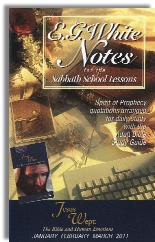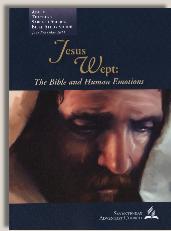|
||||||||||||||
Commentary on "Jealousy"
Day 4: Tuesday, March 1, 2011 - Saul's Jealousy of David: Part 1
Overview
Now we are looking at King Saul in his relationship with David. It is the classic tale of how jealousy can work in the life of a person who is not in harmony with the will of God.
The introductory question is:
Or did the jealousy merely bring out what was already there inside Saul?
The obvious answer is; “yes”. So we will search scripture and uncover what was the root sin ‘inside Saul’ that led to his jealousy of David.
Observations
Let’s examine why Saul became Israel’s king and see how he behaved when he became their leader.
While we would be wrong in thinking so, we could almost blame Samuel for making his evil sons judges over Israel as the reason for their demand of a king, 1 Sam. 8:1-9. However, when the people demanded a king God states that is was him, not Samuel they had rejected. When the people demanded a king like that of the other nations around them they were ignoring that their real need was to permanently put away their “foreign gods” and serve the one and only true God, 1 Sam. 7:3-4; 8:19-20. The people demanded a king like the nations around them and God gave them what they demanded.
Initially, we don’t see what is wrong with the inner character of Saul. Very soon however, in 1 Sam. 13:1-4 we see where he takes credit for a victory over the Philistines that really belonged to the actions of his son Jonathan. In his self-pride, he could not give credit to the one who really brought the victory, which was Jonathan nor God who really gave Jonathan victory.
In 1 Sam. 13:8-13, Saul acted foolishly and unlawfully by offering a burnt offering and the peace offerings. Clearly, he did not trust God or Samuel who was God’s prophet.
In 1 Sam. 14:24 Saul declares a foolish oath that none of his fighting men should eat before the battle was over. When he finds out that his son unknowingly violated the vow, he is trapped in an impossible situation. He should have been able to keep his oath but to do so would have been murder. The one thing he didn’t do was confess that he was a fool and had sinned.
In 1 Sam. 15:2-3 Saul is instructed to not spare any of the Amalekites, including any of their cattle, yet he spared their king, Agag, and the best of their cattle, 1 Sam. 15:9. We learn in verse twelve that he sets up a monument “for himself” at Carmel when God should have been the one who was exalted. When confronted by Samuel about “this bleating of the sheep in my ears”, he blames the people as the reason for not obeying the command of God. Samuel summarizes God’s condemnation with these words; “Behold, to obey is better than to sacrifice”. Saul acknowledges that he sinned but attempts to shift the blame onto to people, 1 Sam. 15:24-25.
We now come to this passage where Samuel announces that God has had enough of Saul’s foolish sinful behavior:
Saul said to Samuel, “I have sinned, for I have transgressed the commandment of the Lord and your words, because I feared the people and obeyed their voice. Now therefore, please pardon my sin and return with me that I may worship the Lord.” And Samuel said to Saul, “I will not return with you. For you have rejected the word of the Lord, and the Lord has rejected you from being king over Israel.” As Samuel turned to go away, Saul seized the skirt of his robe, and it tore. And Samuel said to him, “The Lord has torn the kingdom of Israel from you this day and has given it to a neighbor of yours, who is better than you. And also the Glory of Israel will not lie or have regret, for he is not a man, that he should have regret.” (1 Sam 15:24-29 ESV)
Right after Samuel anoints David to be Israel’s next king we come to this verse concerning Saul:
Now the Spirit of the Lord departed from Saul, and a harmful spirit from the Lord tormented him. And Saul’s servants said to him, “Behold now, a harmful spirit from God is tormenting you. (1 Sam 16:14-15 (ESV)
Summary
- In the hardness of their hearts, the people received the kind of king they demanded. In doing so, they were rejecting God. Saul’s failure was also a failure of the people to serve their one true God and repent of their collective idolatry.
- Saul was the kind of king the people demanded when they asked for a king like the nations around them. The one great flaw in his character is that he simply could not trust and obey God.
- Saul would not give credit where credit was do for his victories over their enemies. This reveals a pride of self over surrender to God.
- Saul acted rashly without considering the consequences of his foolish actions whereas a wise person seeks first and foremost the council of God.
- Whenever and however possible, Saul placed the blame for his own sins onto the actions of others. He simply could not bring himself to repent of his sins and surrender his obedience to God. A godly and wise leader would always give due credit to those he leads.
- While jealousy certainly came to play a large part in Saul’s relationship with David, it was not the root sin that he was guilty of. When we study this account (1 Sam. chapters 8-15) up to where God rejects Saul as king of Israel, there is no mention of jealousy as having any part of why Saul was a failure as king.
Copyright 2011 BibleStudiesForAdventists.com. All rights reserved. Revised February 16, 2011. This website is published by Life Assurance Ministries, Glendale, Arizona, USA, the publisher of Proclamation! Magazine. Contact email: BibleStudiesForAdventists@gmail.com.
The Sabbath School Bible Study Guide and the corresponding E.G. White Notes are published by Pacific Press Publishing Association, which is owned and operated by the Seventh-day Adventist church. The current quarter's editions are pictured above.
Official Adventist Resources
Standard Edition Study Guide Week 10
Teacher's Edition Study Guide Week 10


